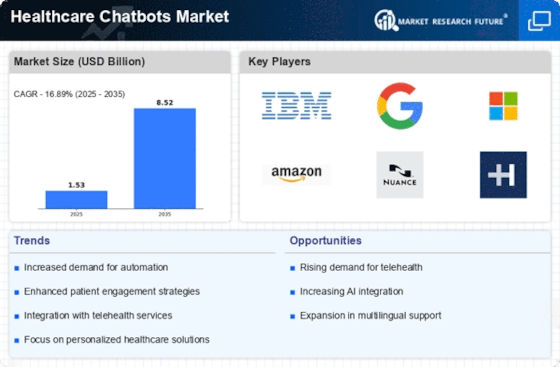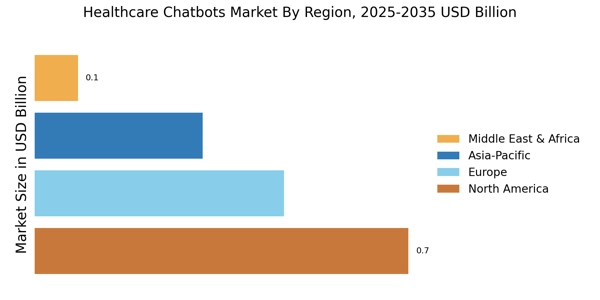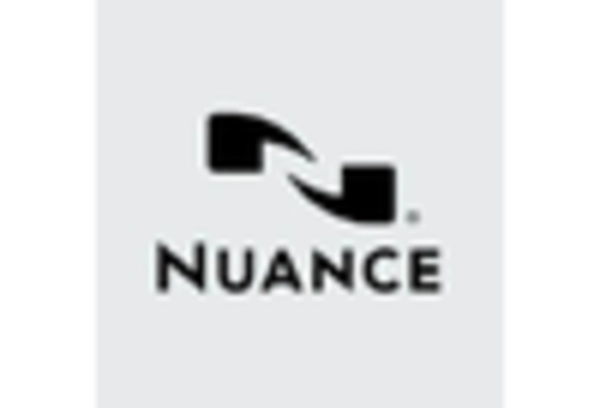Cost Efficiency in Healthcare Delivery
Cost efficiency remains a pivotal driver in the Healthcare Chatbots Market. By automating routine tasks such as appointment scheduling and patient inquiries, chatbots can significantly reduce operational costs for healthcare providers. Studies suggest that implementing chatbots can lead to a reduction in administrative costs by up to 30%. This financial incentive is particularly appealing to healthcare organizations striving to optimize their resources while maintaining high-quality patient care. Furthermore, as healthcare systems face increasing financial pressures, the adoption of chatbots appears to be a strategic move to streamline operations. The potential for cost savings, combined with improved patient satisfaction, positions chatbots as a valuable asset in the evolving landscape of healthcare delivery.
Increased Focus on Mental Health Support
The growing emphasis on mental health support is significantly influencing the Healthcare Chatbots Market. As mental health awareness rises, chatbots are being utilized to provide immediate assistance and resources to individuals seeking help. These digital tools can offer preliminary assessments, coping strategies, and even connect users with licensed professionals. Data indicates that nearly 40% of individuals prefer using chatbots for mental health inquiries due to the anonymity and convenience they provide. This trend reflects a broader societal shift towards destigmatizing mental health issues and increasing access to care. Consequently, the integration of chatbots into mental health services is likely to expand, further driving the growth of the Healthcare Chatbots Market.
Rising Demand for 24/7 Healthcare Access
The Healthcare Chatbots Market is experiencing a notable surge in demand for round-the-clock healthcare access. Patients increasingly seek immediate responses to their inquiries, which chatbots can provide efficiently. This demand is driven by the growing expectation for instant communication in various sectors, including healthcare. According to recent data, approximately 70% of patients prefer using chatbots for basic inquiries, indicating a shift in patient behavior. The ability of chatbots to operate continuously without downtime aligns with the needs of a modern healthcare system, where timely information can significantly impact patient outcomes. As healthcare providers recognize the potential of chatbots to enhance service delivery, investments in this technology are likely to increase, further propelling the Healthcare Chatbots Market.
Advancements in Natural Language Processing
Advancements in Natural Language Processing (NLP) technology are transforming the Healthcare Chatbots Market. Enhanced NLP capabilities enable chatbots to understand and respond to patient inquiries with greater accuracy and relevance. This improvement is crucial, as effective communication is essential for patient engagement and satisfaction. Recent developments indicate that chatbots equipped with advanced NLP can achieve up to 90% accuracy in understanding user intent. As healthcare providers increasingly recognize the importance of effective communication, the integration of sophisticated NLP into chatbots is likely to become a standard practice. This trend not only enhances the user experience but also positions chatbots as essential tools in the healthcare ecosystem, driving further growth in the Healthcare Chatbots Market.
Integration with Healthcare Systems and EHRs
The integration of chatbots with existing healthcare systems and Electronic Health Records (EHRs) is emerging as a critical driver in the Healthcare Chatbots Market. This integration allows chatbots to access patient data, enabling personalized interactions and more efficient service delivery. By connecting with EHRs, chatbots can provide tailored health information, medication reminders, and follow-up care instructions, enhancing the overall patient experience. Recent statistics suggest that healthcare organizations that implement integrated chatbot solutions can improve patient engagement by up to 50%. As interoperability becomes a priority in healthcare, the demand for chatbots that seamlessly integrate with existing systems is expected to rise, further propelling the Healthcare Chatbots Market.

















